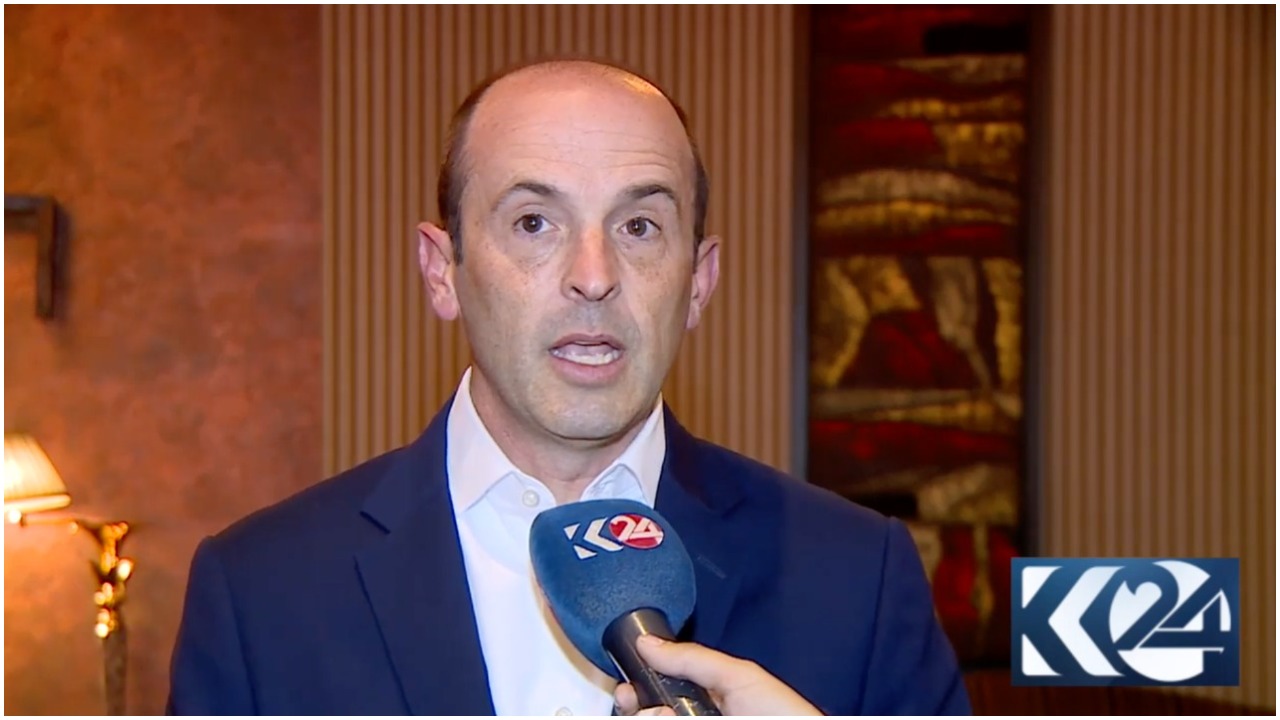Former White House official says Kurds should not be casualty of new indirect US-Iran nuclear talks
“Hopefully, the [Biden] administration can find a way to balance [policy priorities] so that Kurdistan isn’t a casualty from an effort to renew the nuclear deal.”

ERBIL (Kurdistan 24) – A former White House official told Kurdistan 24 on Tuesday that the Biden administration should not ignore Iraq or the Kurdistan Region amid indirect nuclear talks with Iran.
Matthew Zais is the former Principal Deputy Assistant Secretary for the Office of International Affairs at the US Energy Department. He also served for two years in the White House as the director for Iraq on the National Security Council under the Trump administration.
Dr. Zais is now the Vice President of Government Affairs for the HKN Energy Company, with an office in Erbil. He recently met with several senior Kurdish officials, including Prime Minister Masrour Barzani.
It’s always a pleasure to meet my good friends Lt. Gen. Jay Garner and Col. Richard Naab, and @MatthewZais. We discussed latest developments in the Kurdistan Region and Iraq. pic.twitter.com/8LW9PegJAX
— Karim Sinjari (@KarimSinjari) April 25, 2021
The Kurdistan Region “has every reason to be concerned about US policy for Kurdistan,” Dr. Zais told Kurdistan 24 during an exclusive interview in Erbil. However, “right now, I think the focus is on the Iranian nuclear deal.”
He added that “there's great concern that the nuclear deal is the priority and Kurdistan, and Iraqi policy is sort of the second priority.”
“Hopefully, the administration can find a way to balance both so that Kurdistan isn’t a casualty from an effort to renew the nuclear deal,” Dr. Zais affirmed.
President Joe Biden’s administration recently resumed indirect talks with Iran over a return to the 2015 nuclear deal after former President Donald Trump withdrew in 2018.
KRG Representative to the US Bayan Sami Abdul Rahman, during a seminar last Tuesday, also expressed concerns that US-Iran talks could negatively affect Kurdistan.
Read More: Iran-US talks should not negatively impact the Kurds: KRG Envoy
“We want both sides to recognize the value that Kurdistan Region brings to Iraq, and to the neighborhood and to the international coalition against ISIS and extremism and to protect Kurdistan from any negative outcomes.”
The US-led Coalition’s base in Erbil has become the target of rocket and now drone attacks, seen by some observers as a message to the United States, but a threat to the security of the Kurdistan Region and civilians.
In mid-April, a drone loaded with explosives struck the military annex near Erbil International Airport. US CENTCOM Commander Gen. Frank McKenzie described the small device used in the Erbil attack as a “problem” and “the future of warfare.”
Dr. Zais recommended that the US “reassess” the strategic importance of Kurdistan and “its ability to have a robust policy that's going to support Iraq, Iraqi sovereignty and Kurdistan’s security.”
“I think that both can be done in parallel to a nuclear deal with Iran,” he added, noting that “the lack of responses” to the attacks has “caused a lot of concern here.”
Developing Gas Industry
The US Department of Energy in January released a report on the potential of gas development in Kurdistan when Zais was still part of the US Department of Energy.
Dr. Zais said the Kurdistan region could develop a robust gas market that could supply power generation in Kurdistan, supply Baghdad with either natural gas or electricity or export it to Turkey and compete with countries like Russia and Iran.
Iraq still imports gas from Iran but flare 1.5 billion standard cubic feet of gas a day and “import and buy the same volume from Iran, which makes no sense,” he noted.
“I think that gas would complement the oil budget, and it would enable the economy to diversify towards the future, and that’s also something that our company (HKN Energy) here is helping the Kurdistan Region to look at is how to better diversify the economy away from oil and gas.”
Dr. Zais explained that he had discussed ways to diversify Kurdistan’s economy with top Kurdish officials. “Because it's something that's very important to them, the agricultural sector is very important to them, and the ability to produce your own products.”
“There are so many resources in Kurdistan that could be developed more and commercialized and exported like honey and pomegranate, some of the products in Kurdistan that are uniquely good, and would be valuable beyond the Iraqi Kurdistan borders,” he concluded.
Editing by Khrush Najari